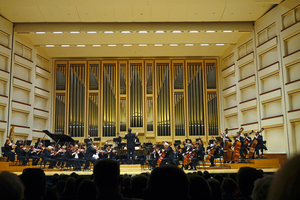Review: CSO Takes Flight With STRAVINSKY FIREBIRD

If you think The Donald is in cahoots with the Russians, take a look at the Charlotte Symphony. They began their 2019-20 Classics season with an all-Tchaikovsky program late last month and continued with another all-Russian bill last weekend featuring music by Modest Mussorgsky, Alexander Glazunov, and Anatoly Liadov before climaxing with the Igor STRAVINSKY FIREBIRD. Are the musicians of Charlotte Symphony and their conductors, first music director Christopher Warren-Green and now resident conductor Christopher James Lees, leading us into the arms of Vladimir Putin?
Or just maybe... they're following their audience's inclinations in melting into the bosom of Mother Russia!
Principal flutist Victor Wang started off the evening with his introductory remarks, citing a previous experience with Lees, when he led Symphony in the pivotal "Infernal Dance" from The Firebird, as emblematic of the special enthusiasm that he brings to the podium. But Lees would first need to conquer Mussorgsky's Night on Bald Mountain in the fearsome arrangement by Nikolai Rimsky-Korsakov. Under Warren-Green's baton, CSO had failed in its two previous assaults on the Mountain - in 2009, when the British conductor was auditioning for his Charlotte post, and in 2016.
Strangely, it's the most familiar part of the tone poem - the macabre, witches' sabbath part - that eluded Warren-Green on both occasions. All the chaotic, nocturnal terror of the piece was drained from the 2009 performance, though the tolling of the bells and the onset of morning at the end of the piece were gorgeous. The more recent performance three years ago attempted to restore the original snap and crackle of the piece, pushing the tempo from the violins, turning up the volume from the brass, and unleashing more sforzando crispness from the percussion. A bit over-the-top, I thought, and not convincing - until the bells sounded, more glorious than ever because of the heightened contrast.
The 2019 version glowed even more fabulously with the dawn as Wang, principal clarinetist Taylor Marino, and principal harpist Andrea Mumm worked their magic. The calm resolution was nearly as impressive as the diablerie that preceded it - so overall, I was still disappointed with our nighttime sojourn. Lees certainly brought all the percussive razor sharpness you could want on the Bald Mountain, and the brass were excellent, with full-bodied trombones rocking the house. Violins were note-perfect quailing before the onset of the brass and astringent in reacting.
Trouble was, Lees eased off the pedal in pushing tempo. Nothing about the witches' sabbath was ever maniacal or threatening to lurch out of control, and the interplay between the violins and the brass, particularly when the strings were asked to suddenly pounce, was lacking in visceral excitement. Listen to how electric it can be on the Naxos recording by Theodor Kuchar and the Ukraine National Symphony.
While you're there, you can also listen to Mussorgsky's original orchestration. You'll likely reach the same conclusion I have: it was Rimsky-Korsakov who was being "modest" if he termed the work we know today an orchestration or even an arrangement. Only six of the familiar notes from the fearsome brass theme were written by Mussorgsky. The next nine add-ons were Rimsky's invention - and all of the concluding dawn episode was his as well. Joint attribution is very much warranted for Bald Mountain, and Ken Meltzer needs to go back to the drawing board with his program notes.
Once Lees and the CSO had exorcised the Halloween - or St. John's Night - demons haunting them on Bald Mountain with Rimsky-Korsakov's original music, they continued to warrant Wang's praise. Glazunov's Stenka Razin was delightfully contoured, though the Cossack rebel's bellicose episodes could have been more turbulent and his dalliance with a Persian princess would have benefited from another splash of Rimsky, namely Scheherezade. The recurring theme, an old Russian folksong known as the "Song of the Volga Boatmen" on recordings by Glenn Miller and Paul Robeson, was handsomely passed back and forth from the brass to the French horns, and Mumm and Marino were again a beguiling combo on harp and clarinet.
Lees continued to be at a loss about creating maximum drama in Liadov's The Enchanted Lake (listen to Vassily Sinaisky's account on Chandos with the Slovak Phil to hear what I mean). But there was no lack of atmosphere here as tremolos from the strings vividly simulated Liadov's lake. Nor was there a dearth of enchantment as the woodwinds made telling contributions and Mumm again excelled, even on the smallest strings of her harp.
With the 1919 Suite from THE FIREBIRD, the most-frequently heard of the three suites that Stravinsky distilled from his 1910 ballet score, Symphony achieved lift-off, playing with their most admirably controlled fury. Lees not only captured the bacchanalian abandon of the "Infernal Dance of King Kastchei" as Wang had predicted, he and the orchestra brought orgiastic celebration to the Finale, where Prince Igor weds his chosen Princess after freeing her from Kastchei's captivity, using the Firebird's magical feather.
Amid the collective sparkle and might of THE FIREBIRD, there were individual exploits to magnify the triumph. Principal oboist Hollis Ulaky had lovely spots in the opening "Introduction and Dance of the Firebird" and later in the tender "Berceuse," where principal bassoonist Olivia Oh spread additional nocturnal wonder. Principal cellist Alan Black and concertmaster Calin Ovidiu Lupanu were both eloquent in the "Dance of the Princesses," but none of the principals made a more memorable impression than Byron Johns, launching the Finale with his beautiful work on the French horn. The forlorn splendor of it gave the fireworks that followed added impact and an onrush of drama.
Reader Reviews

Videos
